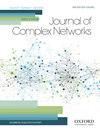An adaptive bounded-confidence model of opinion dynamics on networks
IF 1.5
4区 数学
Q2 MATHEMATICS, INTERDISCIPLINARY APPLICATIONS
引用次数: 0
Abstract
Individuals who interact with each other in social networks often exchange ideas and influence each other's opinions. A popular approach to study the spread of opinions on networks is by examining bounded-confidence models (BCMs), in which the nodes of a network have continuous-valued states that encode their opinions and are receptive to other nodes’ opinions when they lie within some confidence bound of their own opinion. In this article, we extend the Deffuant–Weisbuch (DW) model, which is a well-known BCM, by examining the spread of opinions that coevolve with network structure. We propose an adaptive variant of the DW model in which the nodes of a network can (1) alter their opinions when they interact with neighbouring nodes and (2) break connections with neighbours based on an opinion tolerance threshold and then form new connections following the principle of homophily. This opinion tolerance threshold determines whether or not the opinions of adjacent nodes are sufficiently different to be viewed as ‘discordant’. Using numerical simulations, we find that our adaptive DW model requires a larger confidence bound than a baseline DW model for the nodes of a network to achieve a consensus opinion. In one region of parameter space, we observe ‘pseudo-consensus’ steady states, in which there exist multiple subclusters of an opinion cluster with opinions that differ from each other by a small amount. In our simulations, we also examine the roles of early-time dynamics and nodes with initially moderate opinions for achieving consensus. Additionally, we explore the effects of coevolution on the convergence time of our BCM.网络上意见动态的自适应有界置信模型
在社交网络中相互互动的个人经常交换想法并影响彼此的观点。研究意见在网络上传播的一种流行方法是通过检查有界置信模型(bcm),其中网络的节点具有连续值状态,这些状态对它们的意见进行编码,并且当它们处于自己意见的某个置信范围内时,它们会接受其他节点的意见。在本文中,我们扩展了Deffuant-Weisbuch (DW)模型,这是一个著名的BCM,通过研究与网络结构共同进化的观点的传播。我们提出了一种自适应的DW模型,其中网络节点可以(1)在与相邻节点交互时改变自己的意见,(2)根据意见容忍阈值与邻居断开连接,然后根据同质性原则形成新的连接。这个意见容忍阈值决定了相邻节点的意见是否足够不同而被视为“不一致”。通过数值模拟,我们发现我们的自适应DW模型需要比基线DW模型更大的置信边界才能达到网络节点的一致意见。在参数空间的一个区域,我们观察到“伪共识”稳定状态,其中存在意见集群的多个子集群,这些子集群的意见彼此之间存在少量差异。在我们的模拟中,我们还研究了早期动态和节点的作用,这些节点最初具有达成共识的温和意见。此外,我们还探讨了协同进化对BCM收敛时间的影响。
本文章由计算机程序翻译,如有差异,请以英文原文为准。
求助全文
约1分钟内获得全文
求助全文
来源期刊

Journal of complex networks
MATHEMATICS, INTERDISCIPLINARY APPLICATIONS-
CiteScore
4.20
自引率
9.50%
发文量
40
期刊介绍:
Journal of Complex Networks publishes original articles and reviews with a significant contribution to the analysis and understanding of complex networks and its applications in diverse fields. Complex networks are loosely defined as networks with nontrivial topology and dynamics, which appear as the skeletons of complex systems in the real-world. The journal covers everything from the basic mathematical, physical and computational principles needed for studying complex networks to their applications leading to predictive models in molecular, biological, ecological, informational, engineering, social, technological and other systems. It includes, but is not limited to, the following topics: - Mathematical and numerical analysis of networks - Network theory and computer sciences - Structural analysis of networks - Dynamics on networks - Physical models on networks - Networks and epidemiology - Social, socio-economic and political networks - Ecological networks - Technological and infrastructural networks - Brain and tissue networks - Biological and molecular networks - Spatial networks - Techno-social networks i.e. online social networks, social networking sites, social media - Other applications of networks - Evolving networks - Multilayer networks - Game theory on networks - Biomedicine related networks - Animal social networks - Climate networks - Cognitive, language and informational network
 求助内容:
求助内容: 应助结果提醒方式:
应助结果提醒方式:


